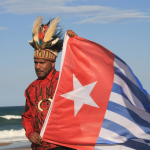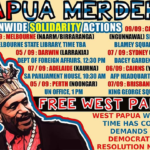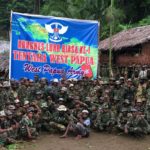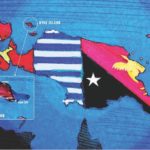In West Papua, the Threat Is the Indonesian Military, Not the Virus
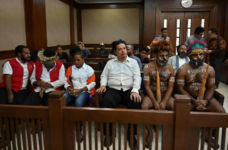
Central Jakarta District Court sentenced six activists demonstrating over West Papuan issues to between eight and nine months prison time on 24 April. The five men and one woman were convicted of treason for their part in a rally staged outside the Jakarta State Palace last August.
Now known as the Jakarta Six, the group is comprised of five West Papuans and an Indonesian national by the name of Surya Anta, who’s the spokesperson for the Indonesian People’s Front for West Papua.
The 500-strong action they took part in on 28 August last year was protesting racist attacks carried out by police against Papuan students in the East Javan capital of Surabaya.
“This is a colonial act,” said United Liberation Movement for West Papua (ULMWP) spokesperson Jacob Rumbiak in reference to the multiple convictions. “We believe it was not treason, because treason means to want to overthrow a legitimate state”.
West Papuans don’t recognise Indonesia’s occupation of their homeland as being legitimate. And Rumbiak further points out that August’s protest had nothing to do with the colonial project that began on 1 May 1963, as the action was against Indonesian authorities persecuting Papuan youths.
Under cover of COVID
“The fear today in West Papua is not COVID-19. The killer is not COVID-19,” Rumbiak told Sydney Criminal Lawyers. “The killer now is the Indonesian military operation. There are ongoing attacks in the highland areas of West Papua.”
The former political prisoner explained that there have only been a few cases of COVID-19 detected in the region, and these haven’t involved Indigenous people. Although, he added that not much testing has been carried out.
Meanwhile, beneath the cover of COVID-19, the Indonesia military has been bolstering its troop numbers in West Papua.
“In cities like Timika and Wamena there are tanks on the street,” Rumbiak continued. “In the highlands, there are military operations around Nduga, Lani Jaya, Tembagapura, around the Freeport mine, and Oksibil in the Star mountains.”
The current conflict in the mountain region broke out in December 2018. It’s involved the displacement of tens of thousands of Indigenous villagers. And by last August, there were widespread independence demonstrations sweeping West Papua.
Fifty seven years and counting
When Indonesia took over administering West Papua, it did so on the proviso that it allow the Indigenous population to hold a self-determination referendum. In 1969, 1,026 Jakarta selected locals took part. And under threat of reprisal, all voted to continue being governed by Indonesia.
Since that time, over half a million West Papuans have been killed, a transmigration program has left the Indigenous population accounting for less than 30 percent of the overall populace in its homeland, while media blackouts have become the norm.
However, in 2017, 1.8 million West Papuans – or 70 percent of the Indigenous population – risked their lives to sign the West Papuan People’s Petition, which is calling for a genuine vote on independence under international supervision.
“We want the United Nations and regional governments to stop Indonesia from using the COVID situation to mask its killing operations,” Rumbiak concluded.
“It is West Papuans – not the Indonesian government – who hold an inalienable right to defend our homes, our people, our sovereignty, our dignity and our liberty.”


